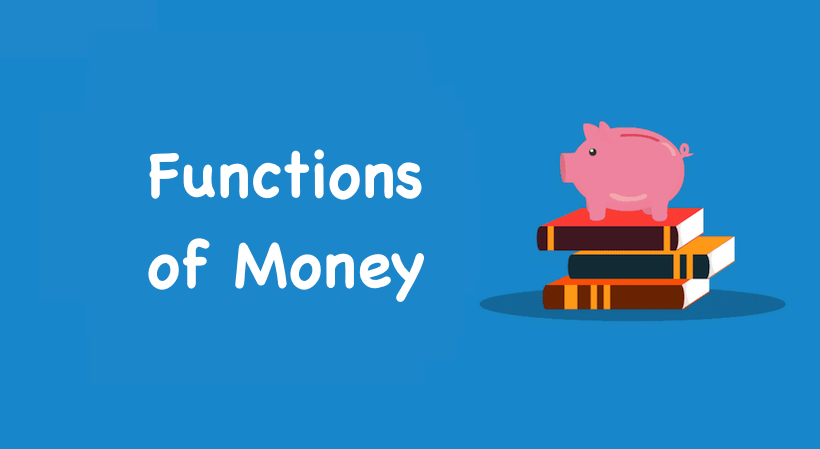Functions of Money: With the advent of banking sector and emerging financial markets in the economy, one requires a precise understanding concerning money; what exactly would term money imply; any object (not necessarily rupee) that circulates widely as a means of payment or does it involve something more to it. Besides this, what is the connection between money, banks, and credit system? The term ‘Money’ was derived from the name of Goddess “Juno Moneta” of Rome
The functions of money have been well summed up in a couplet:
“Money is a matter of functions four, A Medium, a Measure, a Standard and a Store.”
In recent days, the economists have added some new functions to these four functions.
Quick Links
Functions of Money
Money has many important functions to perform. These functions may be classified as follows:
I. Primary Functions
- (a) Medium of Exchange.
- (b) Measure of Value.
II. Secondary Functions
- (a) Store of value.
- (b) Standard of deferred payments.
- (c) Transfer of money.
III. Contingent Functions
- (a) Measurement and distribution of national income.
- (b) Money equalizes marginal utilities/productivities.
- (c) Basis of credit.
- (d) Liquidity
1. Primary functions:
The primary functions of money are really the technical and important functions of money. They are of two types:
(a) Medium of Exchange: Money serves as a medium of exchange. Money facilitates exchange of commodities without double coincidence of wants. Any commodity can be exchanged for money. People can exchange goods and services through the medium of money.
(b) Measure of Value: The value of each commodity is expressed in the units of money. We call it the price. In view of this function of money, the values of different commodities can be compared and the ratios between the prices of different commodities can be determined easily.
2. Secondary functions:
Money has the following secondary functions:
(a) Store of value: The value of commodities and services can be stored in the form of money. Certain commodities are perishable. If they are exchanged for money before they perish, their value can be preserved in the form of money.
(b) Standard of deferred payments: Money serves as a standard of deferred payments. In the modern economies most of the business transactions take place on the basis of credit. An individual consumer or a business man may now purchase a commodity and pay for it in future. Similarly one can borrow certain amount of money now and repay it in future.
(c) Transfer of money: Money can be transferred from one person to another at any time and at any place
3. Contingent functions:
Besides the primary and secondary functions, money has certain contingent functions also. They may be stated as follows:
(a) Measurements and distribution of national income. Nations income of a country can be measured in money by aggregating the value of all commodities. Similarly national income can be distributed to different factors of production by making payments to them in money.
(b) Money equalizes marginal utilities/productivities: The consumers can equalize the marginal utilities of different commodities purchased by them with the help of money. They can thus maximize their satisfaction. Similarly the firms can also equalize the marginal productivities of different factors of production and maximize their profits.
(c) Basis of credit: Credit is created by banks from out of the primary deposits of money. The supply of credit in an economy is dependent on the supply of nominal money. It is not possible to create credit if there is no reserve money.
(d) Liquidity: Money is the most important liquid asset. In terms of liquidity it is superior to all other assets. Money is cent percent liquid.
Recommended Articles







